The Skill No One Wants
Ruminations on being oddly good in a crisis + a graphic novel review, Inktober and October drawing, and general illustrated journal mentions
Happy Sunday everyone!
Thank you for reading today. If you are new here, I feel that some warning is necessary… this post does touch on drawing and routine, memory and habit, the value of an illustrated journal as a catch-all creative practice and as a tool for documenting daily life, but it is also an atypical post. I hope readers don’t unsubscribe based on a post like this. But what is a post supposed to be, really? I don’t promise rose gardens, but I generally do try and offer inroads for you to find your place. I don’t know if those footholds are here this week. This telling is also deliberately convoluted. I don’t know why I do that, but more and more I am watching how this happens, how the building and layering and backtracking and hiding and editing and uncovering and burying go. I started with a single sentence that now appears far down in the post:
There is one thing I am unnaturally good at, something I never intended to be good at. No one goes into it planning to be good at clearing a room to call 911.
Saturday, mid-day: Things are okay.
If you skim your way through, you’ll also find:
A Krispy Kreme hat drawing “for the fun of it”
"If it sounds good, it isn’t practice" (and “write beautiful things”)
Some talk about October drawing (and my history with Inktober)
A short review of a graphic novel, Look Again by Elizabeth A. Trembley
Quotes for the Week
"In the midst of movement and chaos, keep stillness inside of you." — Deepak Chopra
"There are times when we stop, we sit still. We listen and breezes from a whole other world begin to whisper." — James Carroll
"You find peace not by rearranging the circumstances of your life but by realizing who you are at the deepest level." — Eckhart Tolle
"Within you, there is a stillness and sanctuary to which you can retreat at any time and be yourself." — Hermann Hesse
I am not known for my calm.
A haiku from Laura in response to last week's comment section:
A sparkle, a ghost,
Graffiti glows on the wall.
I think, let it be.
Thank you for reading,
Amy
A Familiar Pattern
Some days you are reminded how much can happen in a matter of minutes or hours, how things can turn and change, ebb and flow, all within a blink. There are crescendos, and then there are moments of utter silence. I started writing this week from a specific point in time. Fifteen hours later, things have ebbed, mellowed, stabilized. The apex of crisis, the brink of chaos, those have passed. I could start over, try and craft something pretty, weave a tale, hang a tapestry over the hole in the wall. I could, but I am tired, so very tired. I am tired in the moment, and I am tired of straightening the tapestries, weaving and reweaving and covering holes. I have had many Penelope moments in my life, moments of weaving and unweaving. This.... is not that.
This post deliberately goes in and out and back and forth. Sometimes, we pace, we wander, aimlessly. Sometimes we disrupt our own narrative as an act of self-preservation.
One thing I have never understood is that when the ambulance comes, almost always with sirens on, the sidewalks are empty. No one ever asks. I imagine people watch from windows, pulling curtains aside just enough to see. Curiosity is innate. But there is no one to tell, and no one asks. In some storybook world in my head, the aftermath of calling an ambulance wouldn’t be one of the loneliest moments.
Thursday night: Tonight, I did two things that seem so very predictable. I did them both without thinking. First, I used leftover pasta from the week and made myself a baked macaroni and cheese. I had just intended to heat up the pasta, but without consciously putting it in context, I went through the motions and made mac and cheese. Sitting down with that at the coffee table to eat, I thought about what to watch. Yesterday, I was watching the new season of Virgin River. Logically, I would have continued that. Out of the blue, I turned on Harry Potter: Sorcerer’s Stone.
And then it struck me that I hadn’t simply heated up the leftover pasta with its smashed cherry tomatoes and feta. I’d automatically added white cheddar, some butter, and some cream, salt, pepper, and garlic, and turned it, in essence, into mac and cheese, a slightly more grownup version, but mac and cheese at the core.
That is me on autopilot, mac and cheese and Harry Potter.
Still Thursday: I am bone tired even though I napped during the day. I just can’t seem to stay awake. While I watched the movie, I inked a portrait I snapped Monday of my son in a too-small paper Krispy Kreme hat. I brought the hats home the one time we got donuts this summer, hoping to get a photo with both boys, a photo to mark this transition. The days passed, and the hats sat, waiting. I took a photo the final morning before we left to drop him for graduate school, drew it a day later, and inked it tonight. It’s a lighthearted portrait. It’s a reminder that he, literally, has a big head, but also that he’s a good sport. Drawing him always has meaning. Drawing people we know can be hard to do, but I've come to enjoy seeing one of the boys looking up at me from the page as the lines fill in. This portrait is simple, but it’s smile worthy. It was a good “for the fun of it” prompt response for Week 38 of Illustrate Your Week.
I made mac and cheese. I watched Harry Potter. I drew.
All of these are comfort moves. I find it interesting what we instinctively do to protect ourselves, what we return to in moments of overwhelm, chaos, or uncertainty.
I made mac and cheese. I watched Harry Potter. I drew.
Those details offer a simple set of contours of Thursday. These are simple things.
Before that, I worked. I played guitar. I answered the phone both times when it rang. I took notes. I got names. I drove someone to school because they got lost in time and couldn't make the bus. I researched bikes and bike sizes. I gathered the trash before dark and took out the cans for the morning pickup. I called the hospital.
The first time I called, the link to the phone number from the website didn’t work properly. When I clicked to let the phone dial, I apparently placed a call to Indonesia. (I got an error recording, but later, I saw Indonesia in my recent calls list. Part of my brain is wondering now if there will be a charge.) Still going for the simplest approach (and somehow feeling that writing the number down was too much), I opened the maps app, searched for the hospital, and dialed. The reception for reception was really poor. When I explained that I was trying to get an update on a patient, the voice at the other end told me I had called the parking garage across the street from the hospital.
Good at Many Things
I am good at many things. Historically, that is true. These days, I doubt my skills, but there is one thing I am unnaturally good at, something I never intended to be good at. No one goes into it planning to be good at clearing a room to call 911.
It is weird, objectively, to even know this, to claim this. I am good at 911. How hard is it, you might think. It’s three digits. It’s a simple call.
If you only do it once, that may be true. One and done. If you only do it once, it’s okay to be messy.
Today wasn't my best call, but overall, this is something I am good at. I don't crumble. I don't break down. I am calm. I am logical.
The years all blur together for me now. When was the very first 911 call? I can’t remember. Maybe 15 years ago? One year, it feels like there must have been at least a dozen calls, maybe more. A paramedic asked me today when the last time was, and I couldn’t remember. I tried to think back and couldn’t put my finger on it. It seems like it’s been a while.
I couldn’t remember. I had been jolted from sleep into a chaotic flurry of minutes that involved calling 911.
After they left, and I sat in the empty room trying to sort things out, my fear more intense this time because the rate of the downward spiral has accelerated in the last year, I remembered…. It was May. Of course it was May. It was the week before our son’s graduation from college. That’s been several months, but not really all that long ago. Was there another one at the start of the new year? Maybe? Maybe not. And last December, the week before Christmas.
Calling 911 isn’t about the caller, of course.
This isn’t even something we need to consider as a life skill. Chances are, you’ll do this only a time or two.
Do you sometimes drive along and think to yourself that you are a good driver, that you handled a merge smoothly or that you did a good job parallel parking? We all have these little internal monologues that keep us company, that reinforce our movements in the world.
No one gets a medal for being good at calling 911. I vaguely remember the first time I had to do it, the shock of it. But now, I know the routine. I learned quickly what was necessary, what made things easier. We have to clear the floor, which means pushing furniture out of the way and moving all the things we can from the wall by the door so the door can fully open. All the baskets of laundry, clean or otherwise, in the hallway have to be moved. There used to be an over-the-door basketball goal on the back of the front door. It had to be moved. The heavy self portrait bust that sits in the floor like a doorstop (but behind the door) has to be moved. In the minutes before the ambulance arrives, or sometimes just before I place the call, everything has to be moved. One side of the living room gets pushed to the center so that there is a clear passageway. The house looks like it’s been squeezed. Part of me always feels self-conscious about the mess and how moving everything amplifies that, makes it even more of a mess. I don't even think about the oddity of having the Christmas tree up.
I know our spaces offer clues to our lives, to our stories.
We aren’t supposed to worry about these things in the moment of a crisis.
I unlock the door. If it’s dark, night or early morning, I turn on the porch light.
Through the years, the boys would always stay in another room with the door closed. We used to have a dog, and she had to be closed up in a room with one of the boys. She would bark from that room at the stomping of feet, unknown people in the house.
Depending on the situation, there are other spaces to clear, dishes to move, things to take care of in the few minutes before I call.
Get out the ID and insurance cards.
Print out or find a copy of medications.
Put phone and charger in a bag.
These are the three most important things. Glasses are the next most important. More than a month-long stay during the pandemic, sans glasses, was bad. I try to remember. Today, the contours were all askew. I didn’t get the glasses.
When the paramedics and fire truck unit arrive, there are questions, there are details, there is history, near and far. There is the current moment. There is what is observable and what I know. There is someone to give the IDs and medication list to. There is an attempt to make sure they go to the preferred hospital. There are sometimes questions that surprise me. Mix and match, but they circle around things like this: “Are you the caregiver?” “Is [] normally like this?” “Can [] normally think clearly?”
There is always the disjunct between what things look like in the moment and the fact that things only look “quite” like this in the moment.
Things look like this during sepsis.
Now I can add that things look like this during a hemorrhagic event.
(Two lines I know I will remove. They seem too much.)
There is a hole in the wall that had to be patched years ago from a fall.
The walls are surprisingly thin, surprisingly fragile.
A falling person, a hitting head, goes right through the wall.
I am calm. I don’t overreact. I answer questions. I view my job in this moment is to stay out of the way but to anticipate what is needed. I always say thank you. I watch as transport out the door and down the stairs is managed. I usually snap a photo during this process, a photo of the ambulance. Sometimes I walk to the sidewalk while the transfer to the ambulance happens, wait until they close the doors, try and make sure the bag with the phone is handed to the right person. These are tangible things. Sometimes I draw the ambulance in my illustrated journal. The first year I tried keeping an embroidered stitch journal, I didn’t make it much more than half a year, but I know I recorded two 911 calls, stitching in a small ambulance the first time.
I am not supposed to be good at this.
I never wanted to be good at this.
And, ultimately, it isn’t about me. It isn’t my story. And yet more and more it is. This time, I didn’t handle it so well.
This time, I didn’t go to the street. I felt out of sorts. I had managed to change out of my pajama pants and pull on leggings before I called, but I was keenly aware that I hadn’t brushed my teeth yet. I was groggy. My voice was hoarse, not yet ready for the day. I was still moving things out of the way when they arrived.
I didn’t go to the street. I didn’t snap a photo. I didn’t get the glasses.
This choreographed dance of life and the specter of death that circles around each 911 call felt different this time. Did I do okay? Why does it matter? What difference does it make how the “person at home” does? Do paramedics later sit over donuts and talk about how loved ones behave when they arrive, sirens on, and fill the tiny interior with a half dozen or more bodies?
Things happen suddenly, but there are typically signs. There is always a debate about when to call.
The night before, worried, I updated and printed out a copy of the medications list, after midnight, just in case. The timelines are getting shorter. Things used to progress over days. Now they progress over hours.
Before dawn, there was a fall.
I did my part. I cleared the room, in record time. I got the IDs out and the phone and charger into a bag. I answered questions. I watched transport happen, also in record time. I made sure they heard certain details that are especially important. I went to the window multiple times over the next half hour to see if they had left yet. I know how the timing of these things unfolds. They often sit on the street for a long time.
I was sitting on the couch when I heard footsteps on the stairs and then a knock. (That is not typical.)
They came back to tell me they were going to a different hospital.
That was a tipping point. That change felt complicated. But really, I think it’s simply that these calls are getting harder. My fear and sense of isolation and loneliness is growing.
I’m not ready for this. I can’t do this. I can’t do this on my own. In the aftermath, these are the thoughts that circle, caught in the stillness.
There has always been risk. Every call is a life in the balance. But things have been different this year.
Every time I think I can’t do this, it feels like the realities of what I’ll need to do change, multiply, grow.
I didn’t snap a photo of the ambulance this time, and that bothers me. What if it is the last time? And I didn’t get a photo?
That paralyzing thought brought me to my keyboard... I needed to write down what had happened.
I was thinking about the day, knowing that I will continue to work and do the things I have to do. I will put one foot in front of another. I will wait until I am called from the hospital or until texts start, a sign of bouncing back. At some point, I will take over clothes and glasses, shoes to come home. Way back when, I took chicken salad sandwiches and chai. Today, hospital food service is more like an on-demand food court. No need for sandwiches from home.
Here, left behind, we continue to do our regular things. School. Work. Dinner. TV. The evening. The trash. We go on.
This is what we always do.
I also have a weekend mailing to put together, this one. I wasn’t sure what I was going to land on this week. I posted about Inktober separately, and I was still thinking about talking about practice.
I should erase everything and do that, put the tapestry over the holes, add to the deep, dark tones of a medieval unicorn in a peaceful garden scene. I know I may regret sharing any of this, regret the vulnerability, the honesty, fear the criticisms of navel gazing. I don’t know why it matters to write this, to post this. I don't know who it can help, what it can explain, what dots it connects, what it means, what it reveals. I don’t know if I can let it stand. I’m tempted to put it behind the paywall so that only a few have the chance to lift the curtain. It might disappear in days like vanishing ink.
Sample Journal Pages and Stitch Journal
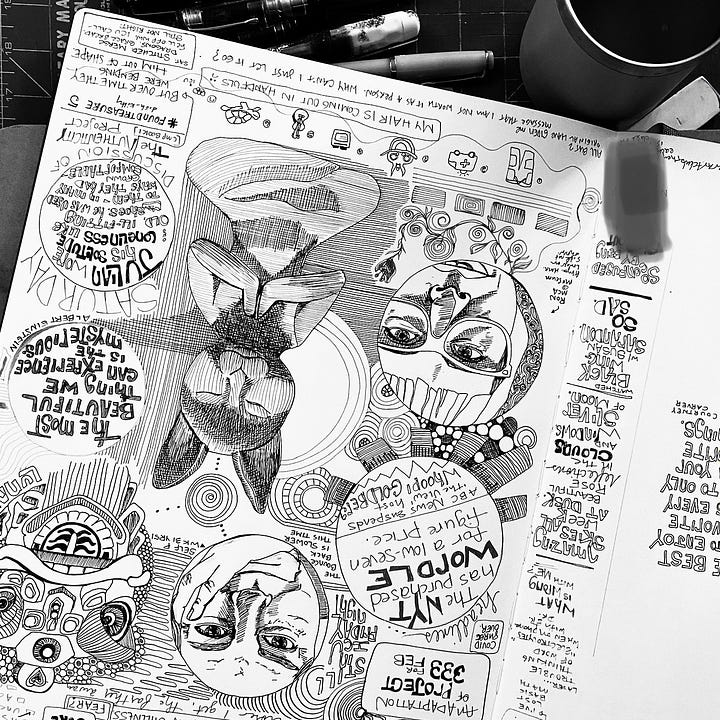
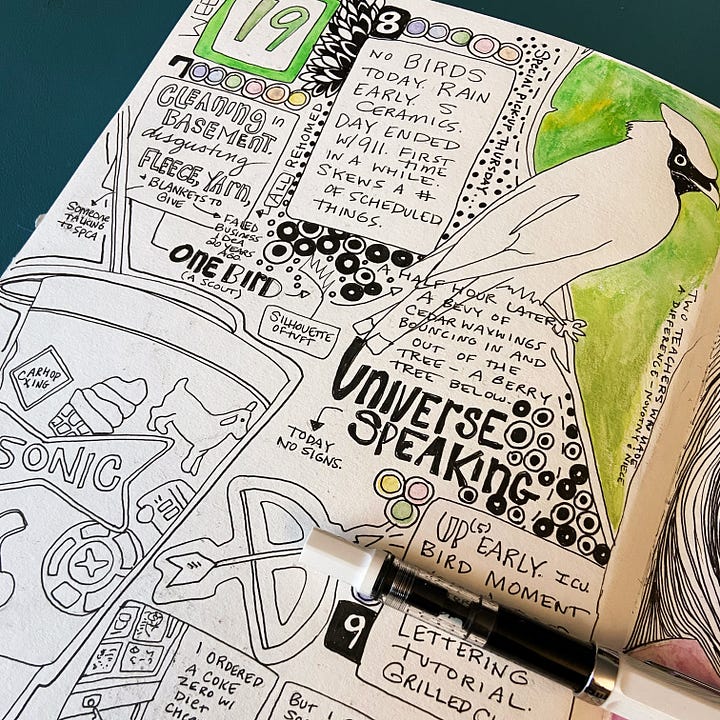
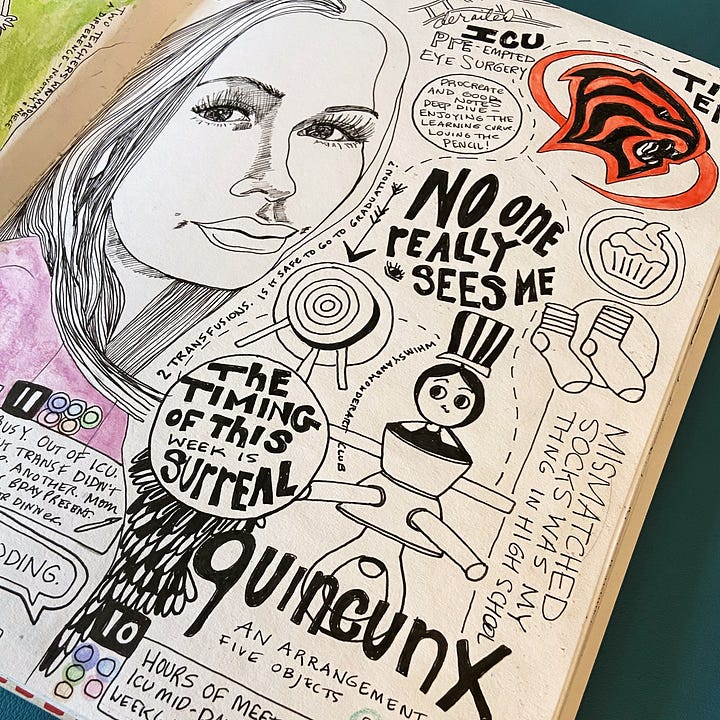
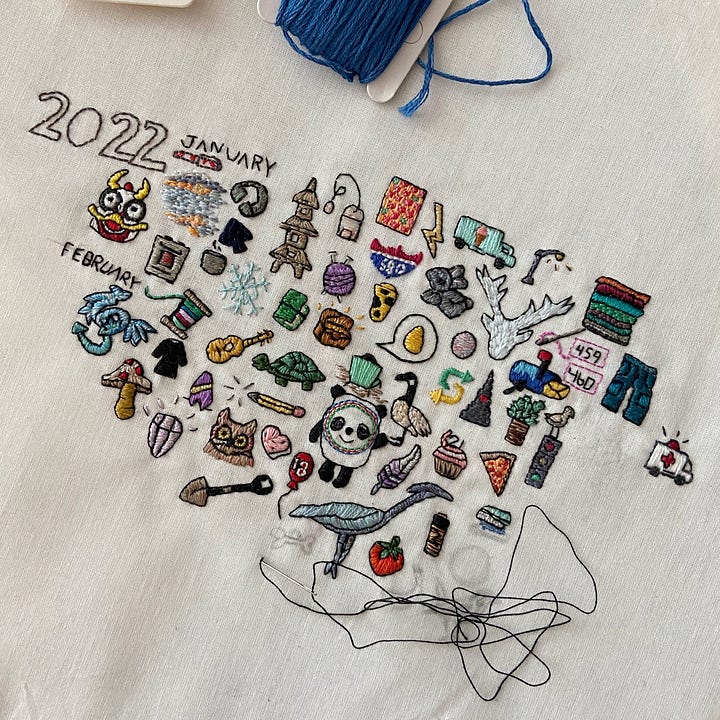
Write Beautiful Things
I talked to my mom over the weekend, and I said this was going to be a banner week, saying goodbye to my son and then heading to a work meeting that always puts me on edge but that has become even more complicated. That’s how I expected the week to go, those general contours, both difficult. I referred to it as a double whammy week. I had no idea there was a third leg of the week in store. In my house, we know that every day can, without warning, be “this” kind of day. Even so, we can’t plan ahead.
Substack continues to evolve. I should be writing beautiful things, but I don’t even know what that would be this week. I bought a guitar. (It took about a thousand hours of research and looking and debating and multiple trips with my son, including a wasted trip over the bridge, and I ended up settling and making a last-ditch decision.) I dismantled a dresser. I had a tuna melt. I had just settled down at the library Tuesday night when they closed early due to poor air quality from fires to the north. I should write about something beautiful, but I can’t get past the simple fact today that I’m good at something that is ridiculous to be good at. No one wants to claim this particular skill, this particular blend of calm, this peculiar invisibility.
Once the danger passes, the fear tends to drift away, mostly exhaustion is left in its wake.
I am tired, but I want to play guitar. I plan to practice for a bit, keeping in mind an interesting piece of wisdom I heard last week in a video: if it sounds good, it’s playing, not practicing. For guitar, I love that distinction. It’s a good reminder and framework for thinking about practice. Practice doesn’t (always or necessarily) need to be performative. It’s fine to stop, to redo, to redo again and again, to start over every few bars. It’s fine to be slow. It’s fine for there to be gaps and delays and wrong notes. Do it again. And again.
In drawing, we don’t approach practice the same way. (Some of the comments last week centered around this difference.) We often are “playing” (as in drawing something recognizable). We do less really deliberate and intentional “practice” that matches up to practicing scales or finger exercises or just repeating a few intro bars over and over. We build muscle memory and slowly refine and evolve our skill by "drawing" (perhaps the equivalent of playing a song). Our "practice" is often rooted in repetition, drawing each day and knowing that the accumulated practice will bring improvement. Sometimes, sure, maybe we do some contours. Or maybe we try new techniques. Maybe we set timers. Maybe we make thumbnails. Maybe we do quick sketches. But we often practice within the "playing" rather than separately.
Sometimes we get locked in a mindset where everything is performative.
Driving back from a drop-off, Thursday morning, dictated while waiting at a stoplight: The one thing I am also good at is not talking about what’s going on. I have become adept at separation or wall creation or partitioning, whatever you might want to call it, over the years. I was never good at making friends and small talk.
The car in front of me has a little sticker in the window that says “Life is better with a Schnauzer.” It brings tears to my eyes. I know that to be true.
Saturday night: Everything is okay. And at the point that you realize that, then all of the words seem pointless. But the reality is that one of these times, the outcome will be different. I needed to write this out. If written at another point, the details might be different, the angle, the perspective, the contours. We are always narrating from a specific moment.
The glasses: Once they were requested, I couldn't find them. There was a frantic search. It turns out they had somehow made their way to the hospital during transit. I had been working on this post, chipping and chiseling and building for the two days before that discovery, and it felt almost like the oddest and most ironic moment of all.
It was the most ironic moment of all until I received a text asking me to bring a chicken salad sandwich.
I feel better having written this. Sometimes, the writing is what we need to do. Truth is sometimes so much more manageable when corralled, reduced, and, at the same time, allowed to blossom as words on a page.
Look Again, A Graphic Novel Memoir
I was excited last week to find Look Again by Elizabeth A. Trembley on my holds shelf at the library. I didn’t know what the graphic novel was about, but I follow Elizabeth at Instagram. (Maybe I first started following when I was attending the weekly SAW Friday Night Comics.) Even once I started reading, I wasn’t sure what the story was about. It begins with a gruesome and frightening moment, an alarming discovery in the woods, a mystery. With the setup, I thought, initially, the point of the story might be something different. The point, in some ways, is that the point kept shifting. Even once the details of the discovery are known, the memory kept shifting. The details kept shifting as the story itself continued to shape and reform, a kaleidoscope of fragments falling into place as new memories were uncovered, forgotten details surfaced, things stitched together into a sequence and timeline. We are pulled along as the narrator builds and layers the timeline of events, presenting multiple variations of the same story.
This is a beautiful book examining story and memory. Look Again asks questions about what we remember and don’t remember, what we don’t know we don’t know, what blanks we have, and how memories can be masked and tucked away only to surface unexpectedly or influence decisions and actions without our knowing. All of this had resonance for me. As someone with unexplained blanks and gaps that have now turned into a lifetime of forgetting and looking back without being able to find the little flags to anchor memory, this book really spoke to me. As a reader, every “variation” gave us a new story, the same story, but an altered story. The additions were sometimes jarring. We would think the story was complete, and then new details would surface. How could those things have been elided, erased, forgotten? These are questions the narrator grapples with and we, as readers, have to ask as we watch the story unfold and watch the narrator’s obsession with the story, with the gaps in memory, play out. From the outside looking in, there is the sense of being pulled along by a string, the starting point constantly being reset as the narrator wrestles with her memory and her fear that we are always unreliable narrators. As a writer, I so understand this fear and the weight of this. I found Look Again really thought-provoking and affirming.
Note: I read Look Again before this week kicked in, but this book on memory and storytelling was an unexpected fit for this week. In thinking about the sequence of events over the last two days, I know how stories continue to build and change, and how quickly the visceral memory of an epicenter fades.
October Drawing
This is the final week in October, and I have spent a lot of time thinking about my October “Inktoportraits” series for this year. Having gotten sidetracked by some (still) ill-fitting attempts to add color this year in my illustrated journal, I’m a bit afraid that my October plan won’t work in black and white. I guess I’ll find out. You can read about my history with Inktober and portrait drawing (and see some photos from prior years) here.
Inktober + Inktoportraits
Made It?
Thank you for reading along! The comments area has become a special place.
I don't know what the inroads are today. There are only a few of you reading, and you've been so generous in playing along each week in the comments. Did I leave you a handhold today?
Do you have a comfort show or a comfort food? (Gilmore Girls is my next go-to. And pizza.)
Flashing if you've ever had to call 911. Lights if you've done it more than once.
Eye if you know yourself to be calm under pressure. Storm if the opposite is true. (It doesn't matter how others perceive you in the moment; how do you feel?)
Parklet if you have parallel parking skills (probably depends on where you live).
Paper hat if you ever made paper "boat" hats with kids.
Two words that start with Z.
As always, feel free to rearrange, embellish, and add your own flair and whimsy. Stressed by such a zany list? Don’t be! Choose one (or none). It’s just an easy way to connect.
Please: No need this week to offer sympathy or whatever form the words might take. I’m not after that. We all have these types of human experiences, in all kinds of shapes and relating to all kinds of different people in our lives. Writing here in a weekly format often means, like tofu, the substack takes on the flavor of the days, of the week, and of the “right now” ups and downs. From Illustrate Your Week to this weekly post, things really do all line up in little “week”-sized boxes. Already, winds have shifted, and the worries have been offset, shelved and reset for the next time. If no other comment feels true for you, maybe just offer space.
Have a peaceful week. Know you are stronger than you might think.
Illustrate Your Week — Week 39
The new prompts for Week 39 have been posted.
Thank you for reading the Illustrated Life substack. Please consider subscribing (for free) to receive the weekly email. Writers need readers, and I am grateful for every reader! Please comment and share with someone else who might enjoy it.
Paid options are available for those who can and want to support the substack, the podcast, and #illustrateyourweek. I am trying to keep things free because I don’t want to shut people out who genuinely can’t afford a subscription model. But there are realities to this project, the work involved, my life, and how much hope I am pinning on this space. Subscriptions not your thing? One-time donations are also appreciated.
(Links to books or tools referenced in posts are Amazon affiliate links. Always check your library.)


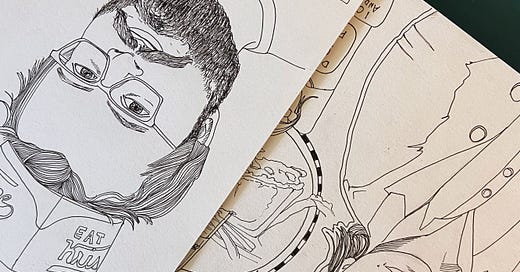



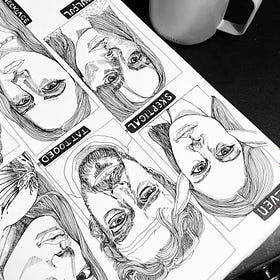
Thank you for sharing. What stood out to me most was your observation that part of this *isn’t* your story while it *is* also becoming your story, and this form or journaling resulted in this encouraging bit of wisdom you shared: “I feel better having written this. Sometimes, the writing is what we need to do. Truth is sometimes so much more manageable when corralled, reduced, and, at the same time, allowed to blossom as words on a page.” 💚
Mac & cheese too. Lights. Eye first, then Storm lingers for days. Absolutely zero Parklet. Paper hats. Zany Zoo (my house right now). I appreciate your bravery in allowing vulnerability and sharing this window into your life. And as always your authenticity and compassion in your creative work and interactions with others. I find writing about the painful parts of life to be really hard. Sharing it even more so. Thank you for the reminder that it makes a difference for how you feel and for others who may read it.